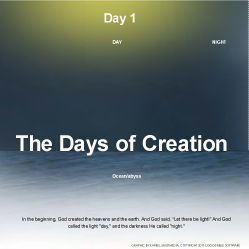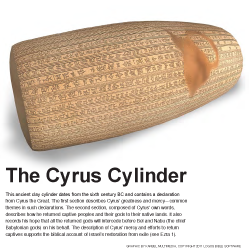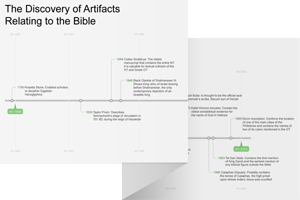45:1–13 God’s plan will be accomplished through Cyrus, a foreign king. Yahweh first took credit for this chain of events in Isa 41:2–4. But now, Cyrus is identified explicitly by name (first in the preceding verse, 44:28). The prophet emphasizes Yahweh’s power over all things—even the actions of foreign kings who unknowingly do His bidding (v. 5)—and the darkness and calamity that plague the world order (v. 7). |
45:1 his anointed one Refers to Cyrus’ selection for a specific purpose—saving Israel.
Cyrus Cyrus conquered Babylon in 539 bc and decreed that the Jewish exiles could return to their homeland (see Isa 44:28; 41:2–4).
conquered Babylon in 539 bc and decreed that the Jewish exiles could return to their homeland (see Isa 44:28; 41:2–4).
whose right hand Symbolizes power and authority. By grasping Cyrus’ right hand, Yahweh is saying that his power is My power.
45:2 I will level the mountains Yahweh goes ahead, clearing away anything that might compete with His exaltedness (compare 40:4; 2:12–17).
45:3 I will give you the treasures of darkness Yahweh’s power knows no limits. All human power of iron, bronze, and craftiness has no ability to keep Him out. He can lead Cyrus where he otherwise could not go.
you may know that I am Yahweh Yahweh’s actions in history are expected to bring the foreign king to an acknowledgment of His power (see Exod 12:31–32; Dan 3:28–29; 4:34).
the one who calls you by your name Emphasizes Cyrus’ special selection for God’s purpose; compare Isa 43:1.
45:4 Israel my chosen one God forgives Israel’s sin for His own sake in 43:25; they had not repented, but He still delivers them because of their status as His chosen. See 41:8 and note.
though you do not know me Cyrus should know it is Yahweh’s hand guiding him (see v. 3 and note). The king of Assyria is held accountable in 10:5–19 for failing to acknowledge Yahweh’s power behind his success.
45:5 there is no god Echoing the pronouncements of 43:11 and 44:6. On the phrase “besides me there is no other,” see 47:8, 10; Zeph 2:15.
 Understanding Israelite Monotheism
Understanding Israelite Monotheism
I gird you The anointing of Cyrus was a symbol that God had equipped him (see note on Isa 45:1).
45:6 from the rising of the sun Even if Cyrus does not know or acknowledge Yahweh, His acts in history will eventually prove His power to the entire world.
45:7 I form light and I create darkness In Gen 1:3–4, God creates light and separates the darkness. This assertion indicates that the darkness, too, was God’s creation—it was not just there to begin with. In the same way, God is described as creating both well-being and calamity.
45:8 let clouds trickle with righteousness Yahweh’s sovereignty over all things good and bad (see Isa 45:7 and note) should be a cause for hope and renewal, not fear and apprehension.
45:9 a potsherd among potsherds of earth The potter and clay image projects a powerful view of God’s sovereignty, creativity, and right to do as He wishes with His creation (see 29:16 and note). The image is used for similar effect in 64:8; Jer 18:4–6 and Rom 9:20–22.
the clay say to the one who fashions it The ridiculousness of a lump of clay talking back to the potter highlights the futility of people—who were made from dust (Gen 2:7) by God Himself—questioning God’s purposes.
45:11 the holy one of Israel A title that emphasizes God’s holiness. See note on Isa 1:4.
its maker The one who formed Israel. See 43:1.
Ask me of the things to come Accurate prophecy is the distinguishing mark of the true God. The mock trial against the gods of the nations also challenges them to demonstrate their power (see 41:23).
my children A father has the right and responsibility to do what is best for his children, even if they don’t understand the circumstances or deserve the concern. The parent-child metaphor was hinted at in v. 10 and used in 1:2.
the work of my hands Compare the potter and clay metaphor used in v. 9. The imagery of “children” and “work of my hands” is combined also in 29:23.
45:12 I myself made the earth Yahweh’s rightful place as ruler over all events and people is regularly supported in chs. 40–48 by His position as Creator of all things (compare vv. 7, 9).
I created humankind upon it See Gen 1:26–27; 2:7–8.
my hands, stretched out the heavens A common poetic image for God’s creative work (Isa 42:5; 44:24; Job 9:8; Psa 104:2).
45:13 he shall set my exiles free An inscription attributed to Cyrus shows that his policy toward exiled populations such as the Jews allowed them to repatriate to their ancestral homelands. Rather than rule by fear and disruption of local power, Cyrus endeared himself to local populations by allowing the deported ruling elites to return.
not for price or a gift Cyrus had no financial incentive to allow the Jews to return, rebuild their city, and restore their temple. After the oppression of Assyria and Babylon, the permission of a foreign king to return could only be understood as divine providence.
45:14 The acquisition of Egypt In Isa 43:3, God exchanged Egypt, Cush, and Seba as the price to redeem Israel. Now the nations are depicted as willfully subjecting themselves to the rule of Jerusalem and Yahweh (see note on 60:5).
there is no other. Besides him there is no God The foreign nations echo what Yahweh declared in v. 5, finally agreeing that He is the only true God. See note on v. 5.
45:16 the craftsmen of idols go together in insult Compare 42:17 and 44:9. In contrast to the certainty that accompanies trust in Yahweh (v. 17), following idols simply leads to more confusion and uncertainty.
45:18 who created the heavens As in v. 12, Yahweh’s power as manifested in creation supports the assertion that He alone is God.
he did not create it as emptiness The Hebrew term tohu (“emptiness”) here may indicate that God did not create without a purpose. In v. 19, the same word connotes futility. The references to tohu in this passage may be allusions to Gen 1:2, where the earth prior to creation is described as tohu and bohu (“empty” and “nothing”).
he formed it for inhabiting The statement that Yahweh intended the world for inhabitants gives a purpose behind His act of creation—He did not create without a master plan.
there is none besides See Isa 44:6 and note.
 Understanding Israelite Monotheism
Understanding Israelite Monotheism
45:19 Seek me in vain Just as God had a purpose behind creating the world, He also had a purpose behind calling Israel His people.
45:20 draw near together Yahweh appeals to the nations to recognize Him as the only true God. The summons is similar to the call for the nations to judge between Him and their deities in 41:1–4, 21–24.
a god who cannot save The futility of idolatry ultimately boils down to the contrast between the living God—Yahweh—who will rise to redeem His people, and the dead gods made by people who cannot redeem, save, or even respond to those who worship them.
45:21 Who made this known from former times, declared it from of old? The proof is the same as in 41:22. The true God predicted events long before they happened.
there is no other god besides me, a righteous God besides me Yahweh alone is capable of saving; He alone is righteous. See 43:10; 44:6. Compare 47:8, 10; Zeph 2:15.
 Understanding Israelite Monotheism
Understanding Israelite Monotheism
a righteous God besides me, and no savior Contrasted with the idols that cannot save (Isa 45:20), Yahweh is the Savior.
45:23 I have sworn by myself Normally oaths are sworn by a greater power. Since there is no greater power, Yahweh swears on His own reputation. See Gen 22:16 and note on Isa 62:8.
Every knee shall kneel down to me Quoted in Rom 14:11 and alluded to in Phil 2:10–11 with a reapplication to Jesus.
45:25 the offspring of Israel The remnant of Israel. See note on Isa 43:5.

|
About Faithlife Study BibleFaithlife Study Bible (FSB) is your guide to the ancient world of the Old and New Testaments, with study notes and articles that draw from a wide range of academic research. FSB helps you learn how to think about interpretation methods and issues so that you can gain a deeper understanding of the text. |
| Copyright |
Copyright 2012 Logos Bible Software. |
| Support Info | fsb |
 Loading…
Loading…



